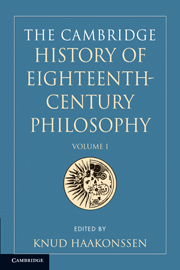Book contents
- Frontmatter
- CONTENTS
- Preface
- Methods of reference and abbreviations
- List of contributors
- I The Concept of Eighteenth-Century Philosophy
- II The Science of Human Nature
- 7 Philosophical Methods
- 8 Human Nature
- 9 Perception and Ideas, Judgement
- 10 Self-Consciousness and Personal Identity
- 11 Reason
- 12 Substances and Modes, Space and Time
- 13 Causality
- 14 Knowledge and Belief
- 15 Scepticism
- 16 Philosophy of Language
- 17 Rhetoric
- 18 Aesthetics
- 19 The Active Powers
- 20 Education
- Biobibliographical Appendix
- Bibliography
- References
7 - Philosophical Methods
from II - The Science of Human Nature
Published online by Cambridge University Press: 28 March 2008
- Frontmatter
- CONTENTS
- Preface
- Methods of reference and abbreviations
- List of contributors
- I The Concept of Eighteenth-Century Philosophy
- II The Science of Human Nature
- 7 Philosophical Methods
- 8 Human Nature
- 9 Perception and Ideas, Judgement
- 10 Self-Consciousness and Personal Identity
- 11 Reason
- 12 Substances and Modes, Space and Time
- 13 Causality
- 14 Knowledge and Belief
- 15 Scepticism
- 16 Philosophy of Language
- 17 Rhetoric
- 18 Aesthetics
- 19 The Active Powers
- 20 Education
- Biobibliographical Appendix
- Bibliography
- References
Summary
BACKGROUND
Eighteenth-century philosophical methodology is a loose collection of divergent theories which can be put together only retrospectively. Our clue must be the word ‘method’ and the associated conceptual tradition, not the interpreter’s particular preconception. The very meaning of methodos – the path of investigation – indicates the relevance of four problem areas. First, how does one ascertain and secure the origins of knowledge? Secondly, how do origins relate to outcomes – in ascending or descending order, by induction or deduction, by analysis or synthesis? Thirdly, how does one avoid arbitrary gaps so that the acquisition, foundation, or presentation of knowledge is a continuous process – a scala intellectus, incremental and certain? Finally, apart from this question of coherence, every consideration of method raises the question of how there can be correspondence between the knowledge claims and reality and of how such correspondence can be known.
Eighteenth-century methodological reflection and adoption of particular methods drew heavily upon the more fertile contributions of the seventeenth century, which saw a fundamental redefinition of traditional theories of procedure in logic, rhetoric, mnemonics, medicine, philosophy, and mathematics. In seventeenth-century rationalistic philosophy, especially in Descartes and Leibniz, we find two different approaches to the issue of how scientific knowledge is possible, the mos geometricus and the mathesis universalis. The former method stems from Euclid and seeks, through resolutio, analysis, to reduce given problems or propositions to indubitable axioms or simple elements, and, going in the opposite direction, through synthesis – as practiced by Euclid himself, according to Descartes – to give the solution of the problem or the proof of the proposition.
- Type
- Chapter
- Information
- The Cambridge History of Eighteenth-Century Philosophy , pp. 139 - 159Publisher: Cambridge University PressPrint publication year: 2006
References
- 2
- Cited by



